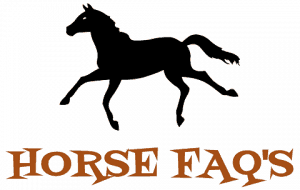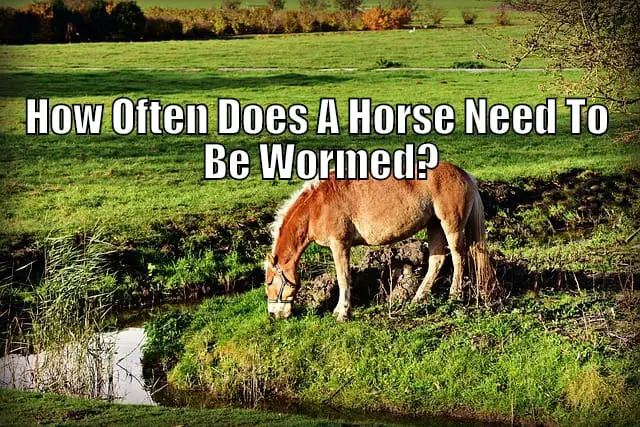Having a horse comes with lots of responsibilities and things you need to learn along the way that you might not have known after first buying a horse. So whether you are looking to buy a horse or already have a horse this is what we have learned with worming horses that can help you get started right away.
So How Often Do You Need To Worm A Horse? Worming your horse can be different for every horse so firstly might be best to ask your vet for suggestions. However, what we have done over many years is 2-4 times a year usually every season or every other season. Starting with Spring, Summer, Fall then Winter. If your horse has been wormed before this should be sufficient.
Why Does A Horse Have To Be Wormed?
Horses can be in danger of getting gastrointestinal parasites which are otherwise known as worms. Now there is a lot more to it then just worming your horse every so many weeks. You may not need to worm your horse at all. If you only have 1-2 horses then this may be so get with your vet first.
If a horse is over the age of 3 and is grazing by itself most of the time this is a prime candidate for not needing to be dewormed. Get a fecal test take to your vet and have checked. Just make sure the horse hasn’t been wormed in 12-16 weeks so they know what is going on in the fecal is natural. A lot of horses over the age of 3 can fight worms off on their own without wormer being needed.
Just stick to what works in your area. Places with lots of humidity and warm air are going to produce more worm problems. If you have a rough winter where it is cold for example wormer is probably not needed then or when it is really hot and dry out.
Make sure you don’t miss out on the Best Gifts for any Cowgirl shipped to your door in as little as 2 days! Just Click Here to see the most popular!
How Does A Horse Get Worms?
Horses get worms usually from other horses that have had worms and grazing in those same pastures. Unfortunately, there is no way around them being infected the majority of the time. As your horse is grazing eggs and larvae of the worms is simply ingested and they are infected. The infection in a pasture will stay for a long time there really is no way to fully clean an infected pasture.
4 Main Types Of Worms That Affect Horses
- Blood and Red Worms
- Roundworms
- Tapeworms
- Bots
Tips And Tricks For Creating A Less Worm Filled Environment
- Keep your stables cleaned at least daily
- Clean and change water frequently
- Spread horse manure on non-used pastures
- If you do spread manure on the horse pasture try to cycle with cows and goats which will clean the leftover larvae up
- Mowing and dragging pastures where manure is spread will also reduce risk. Maybe try mowing 2-3 times a year if you don’t hay those pastures. You can drag with anything like a mattress to an actual dragger just something to break down the manure quicker
- Group your horses according to age so younger horses don’t come into as much contact with worms up until age 3
- Pasture rotation is a must cycle them every 6-8 weeks if pastures are big enough
- Feed horses while in stables in hay racks if possible
- New horses keep separated until you know the overall health of the horse
Worms In Horses Symptoms (How Do You Know If Your Horse Has Worms?)
Even if a horse looks like it is in good health it can still be infected by worms. Here are some signs that it may be time to get a fecal check or give the horse some wormer:
- Colic
- Diarrhea
- Not eating / Loss of appetite
- Coat is getting dull
- Very Lazy
- Losing weight
Related Questions
How to Deworm Your Horse?
Make sure you have gone through all checks like asking your vet, getting a fecal test, and suppling your vet with any meds the horse is on before administering de-wormer.
- Make sure you dose your horse right. Most doses are for 1,200 lb horses. If your horse is bigger then that you may need more if it is for a mini horse you may need a little less. Most horses even if 1,000 lbs can handle the dose no problem.
- We have always used the paste and find it easiest. Your horse might not like the taste so you can feed and water before to make sure they don’t go hungry.
- Make sure all hay and everything is cleared out of their mouth.
- Insert the syringe onto horses tongue by lifting the lips to the back side of mouth.
- There is a gap between there canines and incisors there perfect for the syringe .
- Once inserted press the plunger down to squeeze the medication into their mouth. Be as quick as you can so not to make them upset.
- After completed make sure you hold there head down so they don’t spit out and swallow all of it.
Deworm Horses On Empty Stomach
You can deworm horses on empty stomachs I wouldn’t do it the first time but see if they take the wormer then eat afterward. They may not eat until they get that wormer taste out of their mouth.
How To Deworm Horses Naturally
Pasture management is probably the best way to deworm horses. In cold climates this is much easier since the long winters take care of most of the worm problems. If you combine this with regular fecal exams should be enough for most areas.
Actual natural dewormers like diatomaceous earth have been proven not to work so don’t waste your money.
Conclusion
Try to keep your pastures as clean as possible and your horses away from their manure as much as possible. This will lead to less worm problems.
- Don’t worm if you don’t have to.
- Talk to your vet to get local details.
- Rotate pastures with other livestock if possible.
- mow pasture and drag the more times the better during the year.
What Is The Best Wormer For Horses?
Depending on who you ask they will have different opinions. First thing ask your vet. Most people rotate between ivermectin, something with praziquantel, moxidectin and equimax. This should be sufficient for most areas and scenarios.
The reason you cycle is because what one wormer won’t get the other will usually cover so you have all your bases covered. Plus horses and worms can become more immune to certain wormers this will help prevent that as well.
The purpose of rotating is to cover more of what a horse will come into contact with. So with rotating you get the best coverage against the four main parasites during their different life cycles.
As most areas around the world have different climates you will need to look a little further into this. With resistance build up from worms this was a common problem some 10-20 years ago.
It wasn’t until Ivermectin came out that this problem seemed to solve itself. Scientists have stated that so far it has solved this problem of worms becoming immune to treatments. The way you keep this from happening is not overusing ivermectin and still cycling your wormers.
There are really 4 classes of chemical wormers availabel today that are considered anthelmintics. There is benzimazoles, ivermectins, moxidectin, and pyrantels (like strongid). So if you worm your horse 4 times a year you can just cycle this 4 every three months which is the most simple way to do it.
However that doesn’t mean every horse needs to be wormed 4 times a year. Your horse may only need to be wormed two times a year in that case you will have a two year cycle with the four classes.

